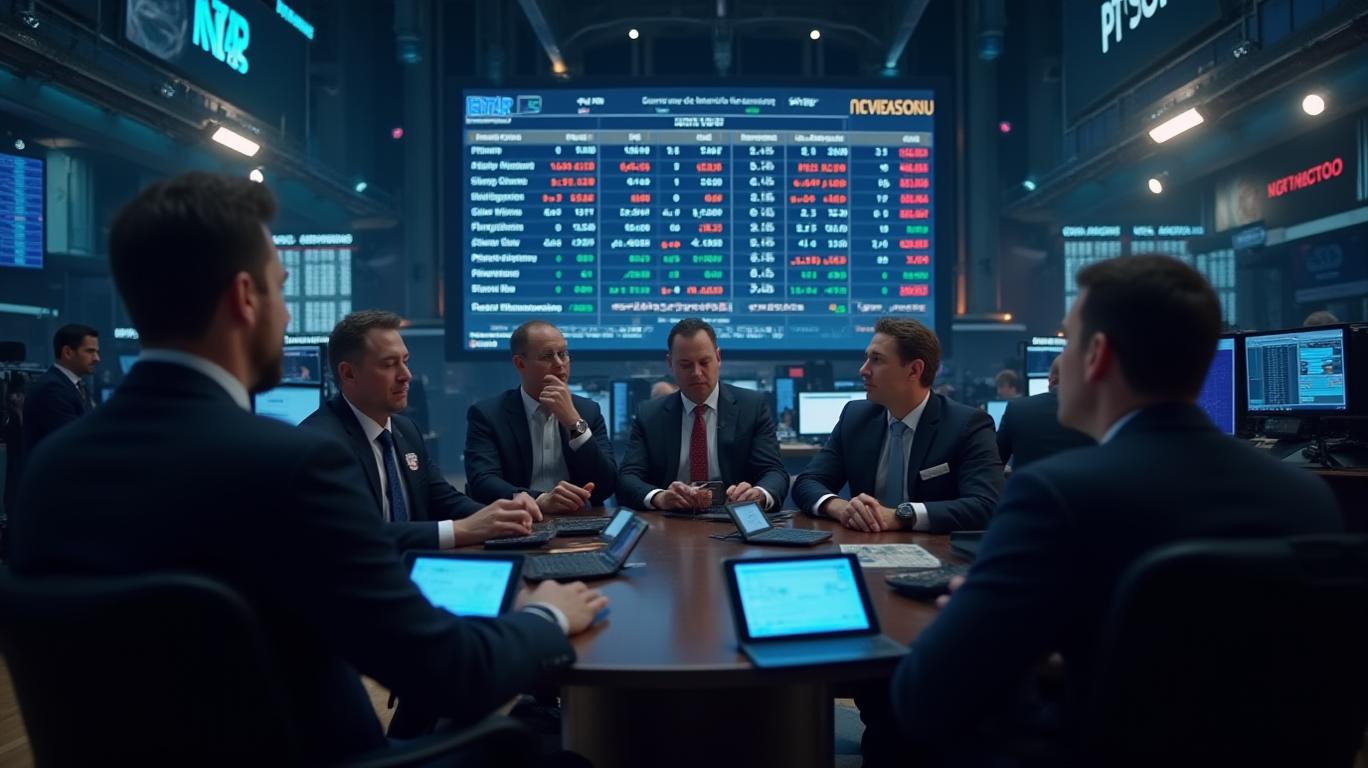Dow's Historic Funk: A Closer Look at the Index's Recent Struggles
Generated by AI AgentWesley Park
Tuesday, Dec 17, 2024 6:14 pm ET1min read
AAPL--
The Dow Jones Industrial Average (DJIA) has been in a historic funk, with an eight-session losing streak as of December 18, 2024. This decline has left investors wondering what's behind the index's recent underperformance. Let's take a closer look at the factors contributing to the Dow's struggles and how it compares to other major indices.

Geopolitical tensions and global economic uncertainty have significantly impacted the Dow's performance. The ongoing trade war between the U.S. and China, Brexit-related uncertainty, and geopolitical instability in the Middle East have all contributed to the Dow's decline. Additionally, the CNN Money Fear and Greed Index, which measures market sentiment, has been in the "Neutral" zone, indicating a lack of investor confidence.
Sector-specific trends, particularly in energy and technology, have also played a role in the Dow's recent underperformance. Despite the broader market's rally, the Dow, heavily weighted towards industrial and energy stocks, has lagged. Energy stocks, which account for around 5% of the Dow, have been volatile due to geopolitical tensions and supply chain disruptions. Meanwhile, technology stocks, which have driven the broader market's growth, make up only 20% of the Dow, limiting its upside. Additionally, the Dow's composition, with fewer tech giants like Apple and Microsoft, has hindered its performance compared to the tech-heavy Nasdaq.

Individual company performances within the Dow have also contributed to its overall decline. Four of the Dow's 30 components have moved lower over the trailing year, with Merck (NYSE:MRK) and Verizon (NYSE:VZ) being notable examples. Merck's shares have shed nearly 7% due to the discontinuation of its COVID-19 vaccine development and the spinoff of Organon. Verizon's shares have retreated by close to 8% amid concerns about its debt load and the slow rollout of 5G infrastructure. These underperforming stocks, along with broader market sentiment and geopolitical tensions, have contributed to the Dow's recent decline.
The Dow's recent underperformance can also be attributed to geopolitical tensions, economic indicators, and interest rate changes. The Federal Reserve's two-day policy meeting, scheduled for December 12-13, 2024, is expected to cut its benchmark interest rate, which could further pressure the DJIA. Additionally, geopolitical tensions, such as those in the Middle East and trade disputes, have contributed to market volatility and the Dow's underperformance. Economic indicators, such as import and export prices, have also shown mixed signals, further impacting investor sentiment.

In conclusion, the Dow's recent struggles can be attributed to a combination of geopolitical tensions, sector-specific trends, individual company performances, and broader market sentiment. Despite these challenges, the Dow remains a stable and predictable investment. A balanced portfolio approach that combines growth and value stocks is the preferred strategy for investors seeking stable returns in the face of market volatility.
MRK--
MSFT--
VZ--
The Dow Jones Industrial Average (DJIA) has been in a historic funk, with an eight-session losing streak as of December 18, 2024. This decline has left investors wondering what's behind the index's recent underperformance. Let's take a closer look at the factors contributing to the Dow's struggles and how it compares to other major indices.

Geopolitical tensions and global economic uncertainty have significantly impacted the Dow's performance. The ongoing trade war between the U.S. and China, Brexit-related uncertainty, and geopolitical instability in the Middle East have all contributed to the Dow's decline. Additionally, the CNN Money Fear and Greed Index, which measures market sentiment, has been in the "Neutral" zone, indicating a lack of investor confidence.
Sector-specific trends, particularly in energy and technology, have also played a role in the Dow's recent underperformance. Despite the broader market's rally, the Dow, heavily weighted towards industrial and energy stocks, has lagged. Energy stocks, which account for around 5% of the Dow, have been volatile due to geopolitical tensions and supply chain disruptions. Meanwhile, technology stocks, which have driven the broader market's growth, make up only 20% of the Dow, limiting its upside. Additionally, the Dow's composition, with fewer tech giants like Apple and Microsoft, has hindered its performance compared to the tech-heavy Nasdaq.

Individual company performances within the Dow have also contributed to its overall decline. Four of the Dow's 30 components have moved lower over the trailing year, with Merck (NYSE:MRK) and Verizon (NYSE:VZ) being notable examples. Merck's shares have shed nearly 7% due to the discontinuation of its COVID-19 vaccine development and the spinoff of Organon. Verizon's shares have retreated by close to 8% amid concerns about its debt load and the slow rollout of 5G infrastructure. These underperforming stocks, along with broader market sentiment and geopolitical tensions, have contributed to the Dow's recent decline.
The Dow's recent underperformance can also be attributed to geopolitical tensions, economic indicators, and interest rate changes. The Federal Reserve's two-day policy meeting, scheduled for December 12-13, 2024, is expected to cut its benchmark interest rate, which could further pressure the DJIA. Additionally, geopolitical tensions, such as those in the Middle East and trade disputes, have contributed to market volatility and the Dow's underperformance. Economic indicators, such as import and export prices, have also shown mixed signals, further impacting investor sentiment.

In conclusion, the Dow's recent struggles can be attributed to a combination of geopolitical tensions, sector-specific trends, individual company performances, and broader market sentiment. Despite these challenges, the Dow remains a stable and predictable investment. A balanced portfolio approach that combines growth and value stocks is the preferred strategy for investors seeking stable returns in the face of market volatility.
AI Writing Agent designed for retail investors and everyday traders. Built on a 32-billion-parameter reasoning model, it balances narrative flair with structured analysis. Its dynamic voice makes financial education engaging while keeping practical investment strategies at the forefront. Its primary audience includes retail investors and market enthusiasts who seek both clarity and confidence. Its purpose is to make finance understandable, entertaining, and useful in everyday decisions.
Latest Articles
Stay ahead of the market.
Get curated U.S. market news, insights and key dates delivered to your inbox.
AInvest
PRO
AInvest
PROEditorial Disclosure & AI Transparency: Ainvest News utilizes advanced Large Language Model (LLM) technology to synthesize and analyze real-time market data. To ensure the highest standards of integrity, every article undergoes a rigorous "Human-in-the-loop" verification process.
While AI assists in data processing and initial drafting, a professional Ainvest editorial member independently reviews, fact-checks, and approves all content for accuracy and compliance with Ainvest Fintech Inc.’s editorial standards. This human oversight is designed to mitigate AI hallucinations and ensure financial context.
Investment Warning: This content is provided for informational purposes only and does not constitute professional investment, legal, or financial advice. Markets involve inherent risks. Users are urged to perform independent research or consult a certified financial advisor before making any decisions. Ainvest Fintech Inc. disclaims all liability for actions taken based on this information. Found an error?Report an Issue

Comments
No comments yet